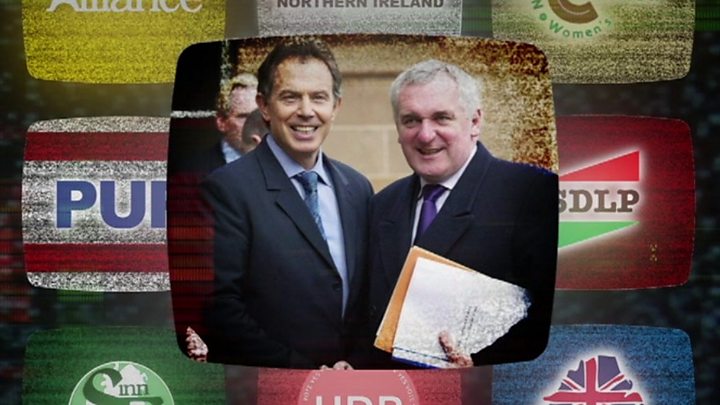Good Friday Agreement played up, suggests Labour's Barry Gardiner
 Image copyright
UK Parliament
Image copyright
UK Parliament
The shadow international trade secretary has suggested the the Irish border issue and the Good Friday deal are being "played up" in Brexit talks for economic and political reasons.
At a Q&A, Barry Gardiner appeared to dismiss the idea that a "normal" border would increase paramilitary activity.
He said it was "hugely in the Republic of Ireland's economic interest" to have no tariff and no external border.
Labour's Owen Smith said the remarks were "reckless and plain wrong".
Mr Gardiner made the remarks at a think-tank session in Brussels last month, but an audio recording has only just become available.
The comments come 20 years after the 1998 peace deal was signed, helping bring an end to The Troubles in Northern Ireland.
Former US president Bill Clinton will attend events in Belfast later to mark the anniversary, along with other key players involved in the talks that led to the peace deal.
The UK and EU have agreed there should be no hard Irish border post-Brexit, but differences remain on how to achieve that goal.
- Q&A: Brexit and the Irish border
- Brexit: Progress check on Irish border issues
- Good Friday Agreement - 20 years on
In a speech at the think-tank event, posted on his website, Mr Gardiner set out Labour's official position on Brexit and a customs union.
He suggested a customs union with the EU was at least a partial solution to the problem of the Irish border.
He said Labour wanted to preserve the status quo in Ireland without a hard border "so as not to jeopardise the 20 years of peace on that island between north and south".
But in the audio recording of remarks he made in a subsequent Q&A session, obtained by the BBC, Mr Gardiner appears to play down the risks of failing to resolve the border issue post-Brexit, and suggests both the Irish government and Sinn Fein may be exaggerating them.
"We must also recognise there are real economic reasons why people have played up the issue of the Irish border and the need to have the shibboleth of the Good Friday Agreement," he said.
"That is because it is hugely in the Republic of Ireland's economic interest to make sure there is no tariff and no external border there."
He added: "We went back to that normal border relationship when we were both in the EU, so a normal border relationship was a completely friction-free border.
"But that does not mean putting in a normal border relationship when one party is no longer in the EU will bring back paramilitary activity.
"That is to confuse cause and effect."
And there were "very good political reasons" for playing up the issue too, he said.
"Sinn Fein - who are trusted colleagues - want to see the unification of Ireland. That is a political objective of Sinn Fein.
"But that doesn't mean a normal border will bring back paramilitary activity."
He said his remarks were "deeply unfashionable".
Reports of his remarks on Twitter over the weekend were dismissed by Mr Gardiner as "nonsense on stilts".
Writing in the Guardian in March, shadow Brexit secretary Sir Keir Starmer said leader Jeremy Corbyn had made it clear that Labour would seek to negotiate a new comprehensive UK-EU customs union to help avoid a hard Irish border.
Ex-shadow Northern Ireland secretary Mr Smith told the BBC: "I worked in Northern Ireland with Barry and it is remarkable that he can display so little understanding of the vital and continuing importance of the Good Friday Agreement, or of the essential need to avoid any hardening of the border in Ireland.
"Labour members will be particularly shocked, but it should concern people in every party and none that there now seems to be a substantial group of senior politicians who are prepared to sacrifice the Good Friday Agreement in order to deliver Brexit."
The 20 March event was a meeting of trade unionists and selected MEPs hosted by the Rosa Luxemburg Stifung - the think tank of Die Linke, the party to the left of Germany's SDP.
A response has been sought from Mr Gardiner, and Labour did not want to comment.

A number of events with take place in Northern Ireland later to mark the anniversary of the signing of the Good Friday Agreement, including a conference at Queen's University in Belfast.
Former US Senator George Mitchell, who chaired the negotiations, will join President Clinton, along with Jonathan Powell - an adviser to then prime minister Tony Blair at the time of the peace agreement - and former taoiseach (Irish prime minister) Bertie Ahern.
Lord Trimble and Seamus Mallon - the former first and deputy first leaders of the Northern Ireland Assembly - will also attend.
Later, Mr Clinton and Mr Mitchell will both receive the freedom of Belfast in a special ceremony at the Ulster Hall.